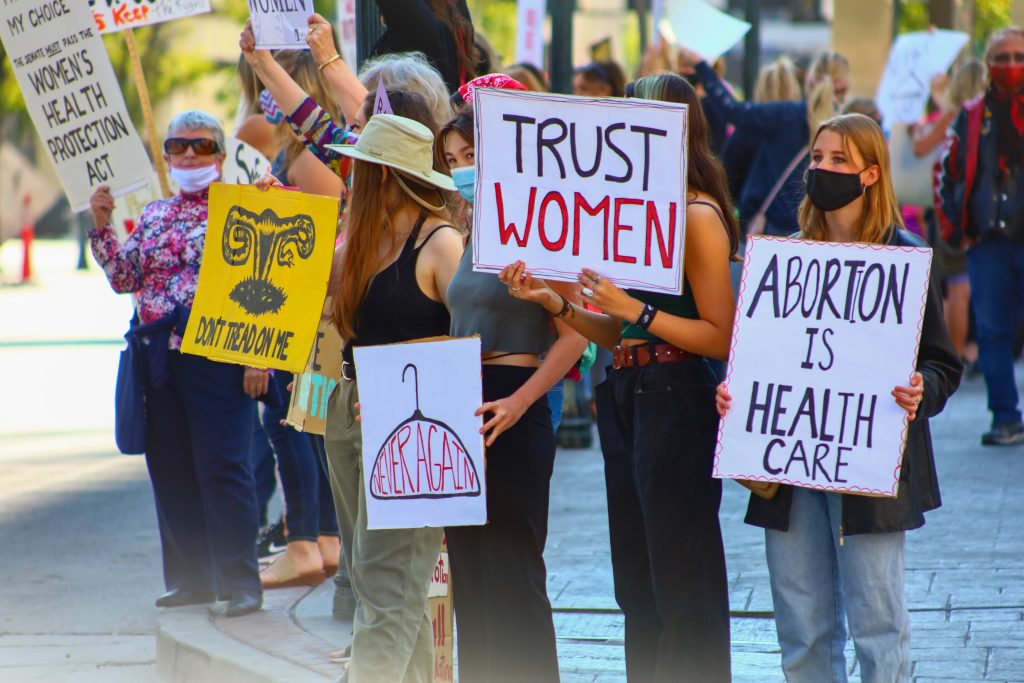
Following on from the enforcement of the Senate Bill 8, on 1st September, women across the nation have been standing up and fighting for their reproductive freedom. A Texas statute that completely dismisses a woman’s fundamental right to decide on matters concerning her body, eliminates the option of terminating a pregnancy that is over six weeks. In many ways then, the Texas law is enacting a near-total ban on abortion, since most women don’t even know that they are pregnant during this timeframe. While it arguably bans abortions after the detection of a foetal heartbeat, medical experts have denounced this term as inaccurate; at six weeks of gestation there is neither a foetus nor a heartbeat.
As a result of this widely accepted reform, there have been growing concerns and dangers regarding women’s health and well-being. In most extreme circumstances, women have resorted to unsafe procedures as their final option.
Questioning gender inequality within the political sphere is not something new, yet the latest loopholes and restrictions reaffirms an ulterior aim: one which will ultimately decimate abortion access nationwide. To consolidate this hostile reaction, not so long ago in 2019, Alabama passed a bill which criminalised doctors who carried out the procedure. Against the backdrop of obstruction by state officials, the response from the Supreme Court has likewise failed to assess the validity and the magnitude of this new proposition. Thus, allowing the ban to temporarily remain in effect. It is evident that the necessity of reproductive choice and access to a full range of reproductive health care service has been constitutionally neglected and denied, however, the root cause of these problems resonate within sexist social arrangements.
Considering abortion is currently one of the most common medical procedures performed on “women aged 15-44 in US”, the limitations enacted by the US government is incredibly absurd. Although, the legality or illegality argument represents a multifaceted ethical, moral, and human issue, the common ground relies heavily on the pervasive exception that abortion amounts to killing a human being. Not only is the recognition of a foetus as a human being deeply problematic, but this sentiment also fails to consider the circumstances in which a woman might seek abortion. Ultimately reinforcing the most controversial aspect of the statute; whilst the reform makes an exception in the case of medical emergencies, it is designed to dismiss pregnancies resulting from rape or incest. To add to the state’s apathy towards abortion, patients are forced to undergo unnecessary medical treatments. For instance, they are required to receive state-mandated counselling, which is designed to discourage them from having an abortion.
Amongst the astonishingly cruel and insensitive assertions, the law, according to The Guardian, “has led to an 80% reduction in abortions”. Primarily stemming from Donald Trump’s time in office, Republican legislatures underwent every opportunity to overturn the Supreme Court ruling of Roe v Wade, which enshrined a woman’s right to terminate a pregnancy until around 24 weeks gestation. To emphasise upon such radicalisation, Poland is also criticised for its denouncement of abortion. By severely restricting the option to permitted cases of rape, incest or when pregnancy threatens a mother’s health, the tribunal “ruled last year that abortions for congenital defects were not constitutional.”
Whether a woman chooses to terminate a pregnancy or not, a woman’s choice should be validated and respected. Too often, sexist ideologies and male dominance over reproductive matters has proliferated the abortion debate. This performance of misogyny cannot go unnoticed and calls for change. For women all over this systematic oppression aligns closely with the unsettling fictional world of Gilead presented in Margaret Atwood’s dystopian novel: The Handmaid’s Tale. An authoritarian republic in which women are forced to birth without a choice, is an incredibly disturbing and threatening future.
For the most part, the Bill has simply functioned to facilitate the demands of a misogynist setting, yet a change in societal attitudes will overlook the possibility of constitutional amendments.
Photo by Manny Becerra on Unsplash
